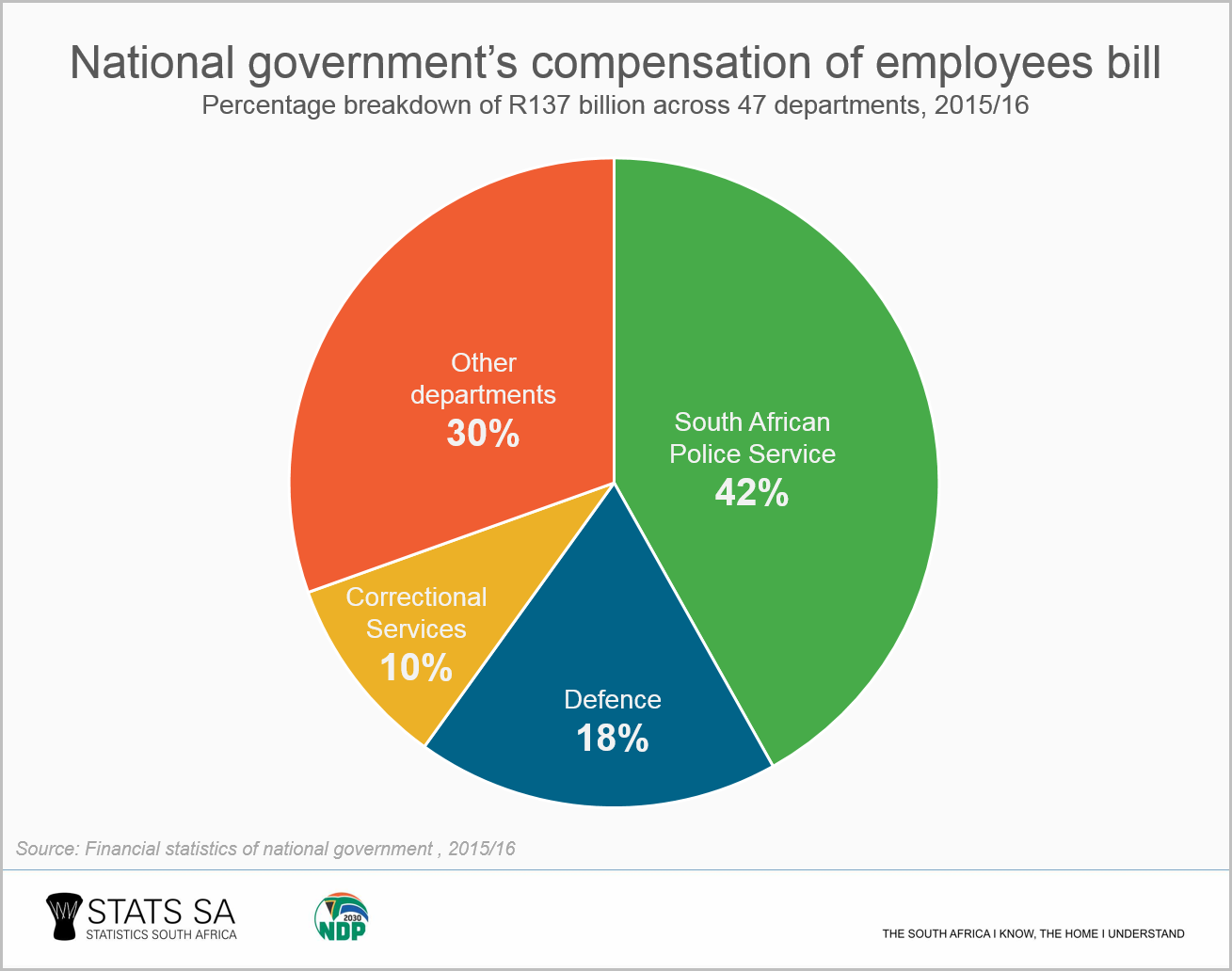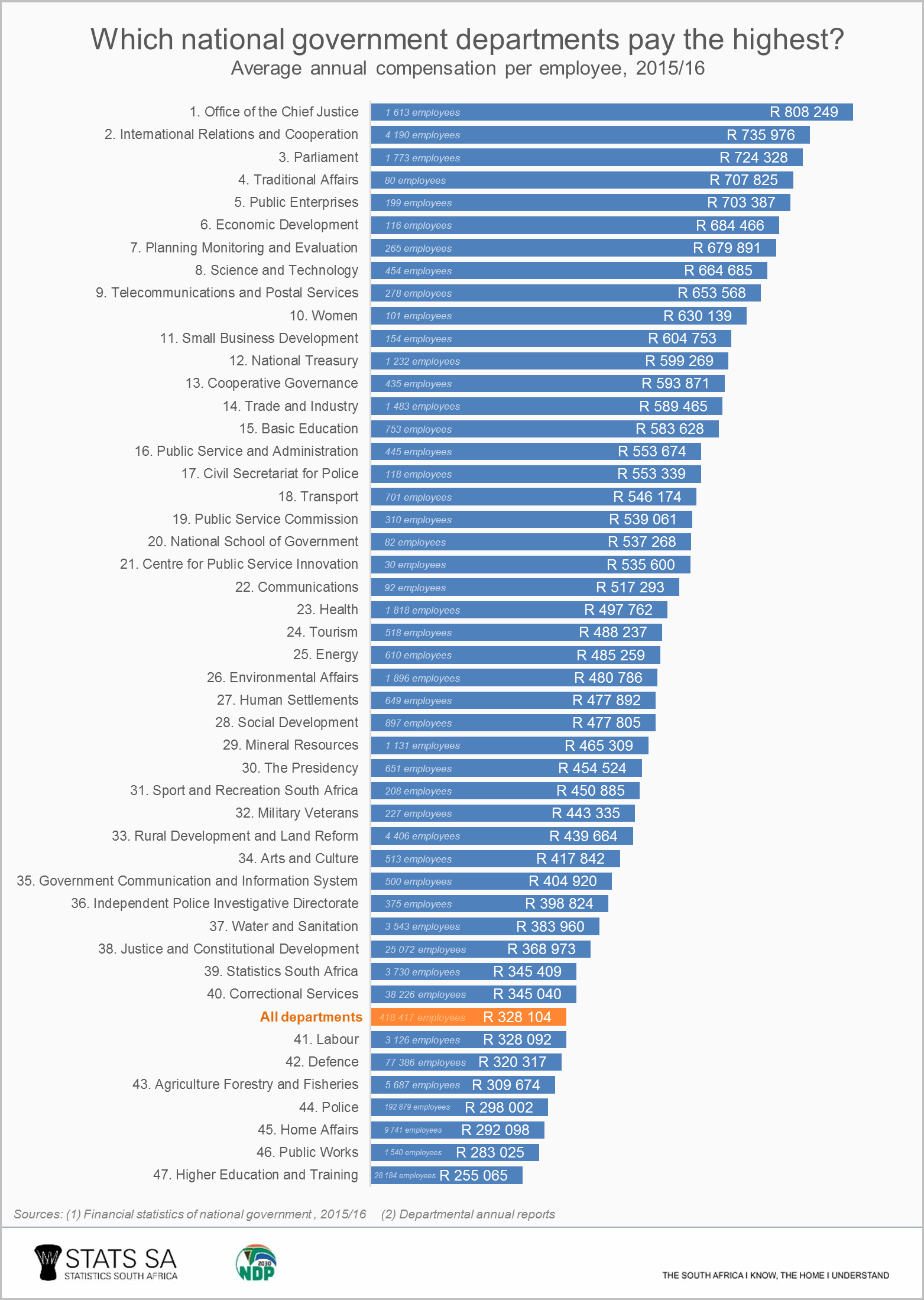CompareGuru Financial Services is an authorised financial services provider FSP. 47696
Compare the average South African’s wages to that of the average civil servant, and you’ll see why so many people are flocking to government.
Government departments have been tipped as some of the most attractive employers in South Africa.
This is likely due to the pay and benefits associated with government positions. But just how much do public servants get paid on average? And are these wages higher than that of the average South African?
StatsSA recently released its data on the highest paying government departments, shedding some light on the topic.
Here's what we learnt...
 However, the share of the wage budget may not result from the levels of pay for employees, but rather the number of employees. This means that SAPS doesn't necessarily pay high salaries, but has a high number of employees.
Luckily, StatsSA also identified what each department pays per civil servant on average. This gives a more accurate picture of which departments pay high salaries. So what does this ranking reveal?
The Office of the Chief Justice took the top spot as the highest-paying government department. The average employee there earns R808 249 per annum.
Second place went to International Relations and Cooperation, while third place went to Parliament.
In what may be a surprise for some, The Presidency only ranked at number 30 on the list - with an average salary of R454 534.
The average wage for employees across all departments stood at R328 104 p.a.
So where did SAPS land up? Well, the department has 192 829 employees - who earn an average of R298 002 per annum. This works out to just over R24 800 per month. While this pales in comparison to many other departments, it is well above the average income for South Africans.
In fact, out of the 47 government department averages in the ranking, even the lowest paid employees earn more than the average South African.
You can see the average wage for different departments in the ranking below:
However, the share of the wage budget may not result from the levels of pay for employees, but rather the number of employees. This means that SAPS doesn't necessarily pay high salaries, but has a high number of employees.
Luckily, StatsSA also identified what each department pays per civil servant on average. This gives a more accurate picture of which departments pay high salaries. So what does this ranking reveal?
The Office of the Chief Justice took the top spot as the highest-paying government department. The average employee there earns R808 249 per annum.
Second place went to International Relations and Cooperation, while third place went to Parliament.
In what may be a surprise for some, The Presidency only ranked at number 30 on the list - with an average salary of R454 534.
The average wage for employees across all departments stood at R328 104 p.a.
So where did SAPS land up? Well, the department has 192 829 employees - who earn an average of R298 002 per annum. This works out to just over R24 800 per month. While this pales in comparison to many other departments, it is well above the average income for South Africans.
In fact, out of the 47 government department averages in the ranking, even the lowest paid employees earn more than the average South African.
You can see the average wage for different departments in the ranking below:


Read More about the most attractive companies to work for in SA below
Government Departments With Highest Average Salaries
According to StatsSA, national government departments spent around R137-billion on employee salaries in 2015/16. The vast majority of these wages went to workers within the South African Police Service (SAPS). In fact, the police service accounted for 42% of wages paid by national government during the financial year. Meanwhile, the Department of Defence accounted for 18% of wages and Correctional Services accounted for 10%. The remaining 30% of funds went towards paying employees in other departments. However, the share of the wage budget may not result from the levels of pay for employees, but rather the number of employees. This means that SAPS doesn't necessarily pay high salaries, but has a high number of employees.
Luckily, StatsSA also identified what each department pays per civil servant on average. This gives a more accurate picture of which departments pay high salaries. So what does this ranking reveal?
The Office of the Chief Justice took the top spot as the highest-paying government department. The average employee there earns R808 249 per annum.
Second place went to International Relations and Cooperation, while third place went to Parliament.
In what may be a surprise for some, The Presidency only ranked at number 30 on the list - with an average salary of R454 534.
The average wage for employees across all departments stood at R328 104 p.a.
So where did SAPS land up? Well, the department has 192 829 employees - who earn an average of R298 002 per annum. This works out to just over R24 800 per month. While this pales in comparison to many other departments, it is well above the average income for South Africans.
In fact, out of the 47 government department averages in the ranking, even the lowest paid employees earn more than the average South African.
You can see the average wage for different departments in the ranking below:
However, the share of the wage budget may not result from the levels of pay for employees, but rather the number of employees. This means that SAPS doesn't necessarily pay high salaries, but has a high number of employees.
Luckily, StatsSA also identified what each department pays per civil servant on average. This gives a more accurate picture of which departments pay high salaries. So what does this ranking reveal?
The Office of the Chief Justice took the top spot as the highest-paying government department. The average employee there earns R808 249 per annum.
Second place went to International Relations and Cooperation, while third place went to Parliament.
In what may be a surprise for some, The Presidency only ranked at number 30 on the list - with an average salary of R454 534.
The average wage for employees across all departments stood at R328 104 p.a.
So where did SAPS land up? Well, the department has 192 829 employees - who earn an average of R298 002 per annum. This works out to just over R24 800 per month. While this pales in comparison to many other departments, it is well above the average income for South Africans.
In fact, out of the 47 government department averages in the ranking, even the lowest paid employees earn more than the average South African.
You can see the average wage for different departments in the ranking below:

Average Salaries For South Africans
But what does the average South African earn? This depends mostly on the industry which they work in. According to the 2014/15 Living Conditions Survey, the average South African household earned R138 168 p.a. in 2015. This survey took into account total income for households, rather than just the income for individuals. What the findings show is that civil servants on average earn much more than regular South African households every year. According to a report by the National Minimum Wage Research Initiative, the average South African earns around R8 669 per month. This adds up to an annual income of around R104 028. These figures show that the average civil servant earns over three times the income of the average South African. But how do these figures compare when looking at specific industries?



